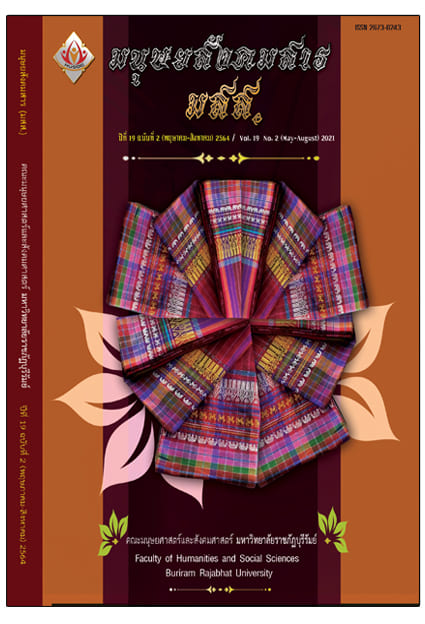ความแตกต่างทางชาติพันธุ์กับภูมิปัญญาท้องถิ่น ในการอนุรักษ์ทรัพยากรป่าไม้
Main Article Content
บทคัดย่อ
การศึกษาครั้งนี้มีวัตถุประสงค์เพื่อศึกษาสภาพบริบททางภูมิสังคมและสิ่งแวดล้อม รวมถึงศึกษาการอนุรักษ์ภูมิปัญญาท้องถิ่นในการอนุรักษ์ทรัพยากรป่าไม้ของกลุ่มชนชาติพันธุ์ในสภาพภูมิสังคมที่แตกต่างกัน และศึกษาปัญหาและอุปสรรคพร้อมกับแนวทางการแก้ไขรวมทั้งวิธีการจัดการที่ควรจะเป็น โดยได้เลือกชุมชน บ้านโปง ตำบลป่าไผ่ อำเภอสันทราย จังหวัดเชียงใหม่ ซึ่งเป็นกลุ่มชนพื้นเมืองในเขตพื้นที่ราบลุ่มที่อยู่ใกล้เมืองและชุมชนลุ่มน้ำแม่ต๋อม ตำบลอมก๋อย อำเภออมก๋อย จังหวัดเชียงใหม่ เป็นกลุ่มชนชาติพันธุ์กะเหรี่ยงในเขตพื้นที่สูงและห่างไกลจากชุมชนเมือง กลุ่มผู้ให้ข้อมูลเลือกแบบเจาะจงประกอบด้วย ผู้นำชุมชน ปราชญ์ชาวบ้าน โดยใช้แบบสัมภาษณ์เชิงลึกและแบบสังเกตในการรวบรวมข้อมูล นำมาวิเคราะห์เชิงเนื้อหา ผลการศึกษาพบว่า สภาพบริบทของสองชุมชนมีความแตกต่างกันทั้งในด้านภูมิศาสตร์และสังคม วัฒนธรรม แต่การได้รับผลประโยชน์จากทรัพยากรป่าไม้ของชุมชนไม่มีความแตกต่างกัน ชุมชนชาติพันธุ์กะเหรี่ยงในพื้นที่สูงที่เคยมีฐานคิดทางด้านภูมิปัญญา ความเชื่อสิ่งเหนือธรรมชาติมาอย่างยาวนาน ไม่ได้นำประเพณีกลับมาปฏิบัติเหมือนในอดีตด้วยเหตุปัจจัยการเปลี่ยนแปลงทางด้านเศรษฐกิจ การทำเกษตรเชิงเดี่ยวในพื้นที่ ในขณะที่ชุมชนบ้านโปงกลับมีความยึดเหนี่ยวทางสังคมและร่วมกันรักษาป่าโดยใช้วิถีภูมิปัญญาของชุมชน กระบวนการมีส่วนร่วมจนทำให้ป่าไม้ยังคงความอุดมสมบูรณ์จนถึงปัจจุบัน ส่วนการอนุรักษ์ภูมิปัญญาสู่คนรุ่นต่อไปพบว่ายังเป็นปัญหาของชุมชนที่กลุ่มเยาวชนละทิ้งถิ่นฐานเข้าสู่สังคมเมือง แต่ชุมชนทั้งสองมีแนวคิดที่จะรื้อฟื้นและหาแนวทางเพื่อการจัดการอย่างมีส่วนร่วม โดยเฉพาะการจัดกิจกรรมเสริมให้กับกลุ่มเยาวชนที่มีความสนใจ
Article Details

อนุญาตภายใต้เงื่อนไข Creative Commons Attribution-NonCommercial 4.0 International License.
เนื้อหาและข้อมูลในบทความที่ลงตีพิมพ์ในวารสารทดสอบระบบ ThaiJo2 ถือเป็นข้อคิดเห็นและความรับผิดชอบของผู้เขียนบทความโดยตรงซึ่งกองบรรณาธิการวารสาร ไม่จำเป็นต้องเห็นด้วย หรือร่วมรับผิดชอบใดๆ
บทความ ข้อมูล เนื้อหา รูปภาพ ฯลฯ ที่ได้รับการตีพิมพ์ในวารสารทดสอบระบบ ThaiJo2 ถือเป็นลิขสิทธิ์ของวารสารทดสอบระบบ ThaiJo2 หากบุคคลหรือหน่วยงานใดต้องการนำทั้งหมดหรือส่วนหนึ่งส่วนใดไปเผยแพร่ต่อหรือเพื่อกระทำการใดๆ จะต้องได้รับอนุญาตเป็นลายลักอักษรจากวารสารทดสอบระบบ ThaiJo2 ก่อนเท่านั้น
เอกสารอ้างอิง
Chumnan, T., et al. (2017). The changing of economics that effected to social status of community in Chiang Rai province. Rajabhat Chiang Mai Research Journal, 19(1), pp. 105-111. [in Thai]
Chumpa, N., et al. (2019). Cultural resources knowledge management and development guidelines of Khamu ethnic group in Huay-lan village, Wiang Kaen district, Chiang Rai province. Journal of Community Development and Life Quality, 7(1), pp. 12-23. [in Thai]
Interatep, S., et al. (2017). State of problems and development of local herbs consumption wisdom transfer for
green living in the community, Srakaew province. Journal of Humanities and Social Sciences Valaya alongkorn, 12(2), pp. 275-285. [in Thai]
Keyes, Charles F. (1989). Buddhist politics and their revolutionary origins in Thailand. International Political Science Review, 10(2), pp. 121-142.
Nunart, N. (2017). Local wisdom as the value of life and culture for sustainable education. Social Sciences Research and Academic Journal, 12(34), pp. 17-26. [in Thai]
Royal Forest Department. (2020). Forestry statistics data 2018. Retrieved on 20 April 2020 from http://forestinfo.forest.go.th/Content/file/stat2561 [in Thai]
Puthong, D. (2018). The community forest management for sustainability using process of public participation and local tradition in northern Thailand region. Journal of Admisnistrative and Management, 6(2), pp. 80-94. [in Thai]
Sirasoontorn, P. (2004). Social development concept and theory. Phitsanulok; Naresuan University. [in Thai]
Santasombat, Y. (2004). Ecology ethnic biology resources and community rights. Chiang Mai: Withindesign. [in Thai]
Tiacharoen, S., et al. (2017). The model of knowledge management for local wisdom in school toward creative economic development and sustainable community. Veridian E-Journal Silpakorn University Humanities, Social
Sciences, and Arts, 10(3), pp. 1371-1392. [in Thai]
Wongwatthanaphong, K. (2016). Impacts of commercial agricultural production system on Hmong ethnic groups. Journal of Southern Technology, 9(1), pp. 69-74. [in Thai]


